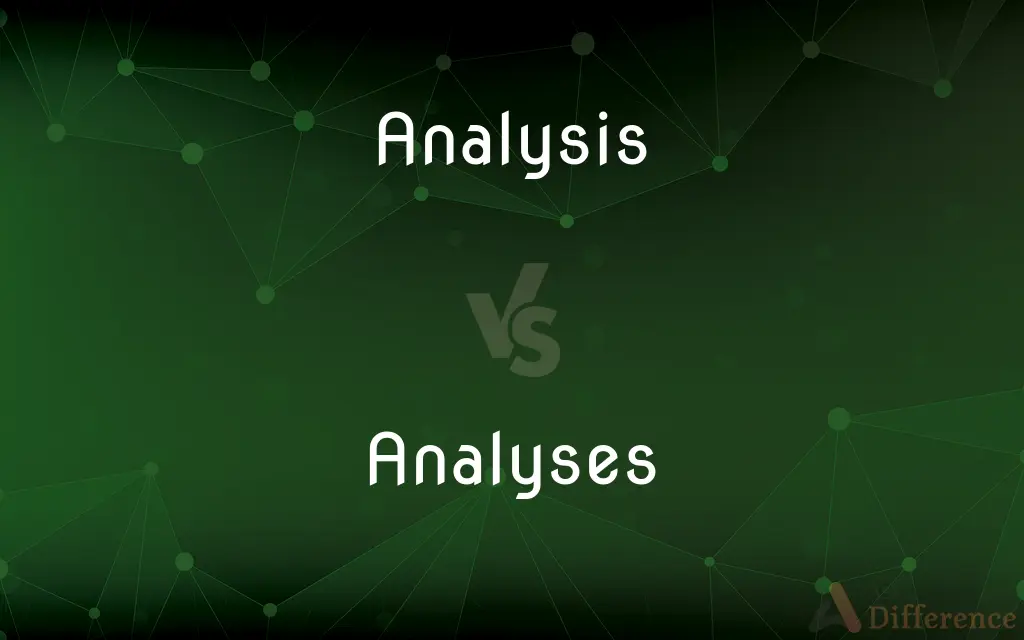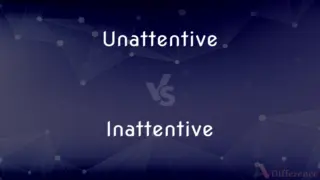Analysis vs. Analyses — What's the Difference?
Edited by Tayyaba Rehman — By Fiza Rafique — Updated on September 21, 2023
Analysis is the singular form referring to a detailed examination or study of something. Analyses is the plural form of analysis, referring to multiple such examinations or studies.

Difference Between Analysis and Analyses
Table of Contents
ADVERTISEMENT
Key Differences
Analysis refers to the singular act of examining, interpreting, or dissecting something in detail. It often involves breaking down a complex subject or substance into its constituent parts. Analyses, on the other hand, denotes multiple instances of such examinations.
In academia, a research paper may present an analysis of a particular problem. When multiple research papers are collected, they offer various analyses of related or different issues.
In business, an analysis of market trends may guide strategy. However, a comprehensive study might include multiple analyses focusing on different markets, consumer behaviors, or competitors.
In medicine, an analysis of a blood sample can provide crucial data for diagnosis. In a more complex case, several analyses could be carried out on different samples or from different angles.
While analysis can stand alone as a single evaluation, analyses represent a collection or series of these individual evaluations, often providing a more comprehensive or multifaceted view of the subject matter.
ADVERTISEMENT
Comparison Chart
Number
Singular
Plural
Focus
Single examination
Multiple examinations
Usage Context
Individual study
Collection of studies
Subject Matter
Can be one subject/aspect
Often multiple subjects/aspects
Complexity
Less comprehensive
More comprehensive
Compare with Definitions
Analysis
A detailed examination of elements or structure.
The analysis of the data revealed some interesting patterns.
Analyses
Studies aimed to identify multiple key factors or causes.
Economic analyses over the years show fluctuating trends.
Analysis
The identification of parts and their relationships.
His analysis focused on the narrative techniques of the novel.
Analyses
Plural of analysis; multiple detailed examinations.
The book compiles analyses from various experts.
Analysis
A study to identify causes, key factors, and possible results.
The economic analysis predicts a downturn.
Analyses
Several methods of dissecting or interpreting.
The scientist performed multiple analyses to confirm the results.
Analysis
Interpretation of data or an expression.
Her analysis of the painting unveiled its deeper meaning.
Analyses
Grouping of individual evaluations.
The journal published analyses on different facets of the issue.
Analysis
Analysis is the process of breaking a complex topic or substance into smaller parts in order to gain a better understanding of it. The technique has been applied in the study of mathematics and logic since before Aristotle (384–322 B.C.), though analysis as a formal concept is a relatively recent development.The word comes from the Ancient Greek ἀνάλυσις (analysis, "a breaking-up" or "an untying;" from ana- "up, throughout" and lysis "a loosening").
Analyses
Variant of analyze.
Analysis
Detailed examination of the elements or structure of something
Statistical analysis
An analysis of popular culture
Analyses
The separation of an intellectual or material whole into its constituent parts for individual study.
Analysis
Short for psychoanalysis
Other schools of analysis have evolved out of the original disciplines established by Freud
Analyses
The study of such constituent parts and their interrelationships in making up a whole.
Analysis
The separation of an intellectual or material whole into its constituent parts for individual study.
Analyses
A spoken or written presentation of such study
Published an analysis of poetic meter.
Analysis
The study of such constituent parts and their interrelationships in making up a whole.
Analyses
The separation of a substance into its constituent elements to determine either their nature (qualitative analysis) or their proportions (quantitative analysis).
Analysis
A spoken or written presentation of such study
Published an analysis of poetic meter.
Analyses
The stated findings of such a separation or determination.
Analysis
The separation of a substance into its constituent elements to determine either their nature (qualitative analysis) or their proportions (quantitative analysis).
Analyses
A branch of mathematics principally involving differential and integral calculus, sequences, and series and concerned with limits and convergence.
Analysis
The stated findings of such a separation or determination.
Analyses
The method of proof in which a known truth is sought as a consequence of a series of deductions from that which is the thing to be proved.
Analysis
A branch of mathematics principally involving differential and integral calculus, sequences, and series and concerned with limits and convergence.
Analyses
(Linguistics) The use of function words such as prepositions, pronouns, or auxiliary verbs instead of inflectional endings to express a grammatical relationship; for example, the cover of the dictionary instead of the dictionary's cover.
Analysis
The method of proof in which a known truth is sought as a consequence of a series of deductions from that which is the thing to be proved.
Analyses
Psychoanalysis.
Analysis
(Linguistics) The use of function words such as prepositions, pronouns, or auxiliary verbs instead of inflectional endings to express a grammatical relationship; for example, the cover of the dictionary instead of the dictionary's cover.
Analyses
Systems analysis.
Analysis
Psychoanalysis.
Analyses
A collection of interpretations.
His analyses of different artworks are quite enlightening.
Analysis
Systems analysis.
Analysis
(countable) Decomposition into components in order to study (a complex thing, concept, theory etc.).
Analysis
(countable) The result of such a process.
Analysis
The mathematical study of functions, sequences, series, limits, derivatives and integrals.
Mathematical analysis
Analysis
Proof by deduction from known truths.
Analysis
The process of breaking down a substance into its constituent parts, or the result of this process.
Analysis
The analytical study of melodies, harmonies, sequences, repetitions, variations, quotations, juxtapositions, and surprises.
Analysis
Psychoanalysis.
Analysis
A resolution of anything, whether an object of the senses or of the intellect, into its constituent or original elements; an examination of the component parts of a subject, each separately, as the words which compose a sentence, the tones of a tune, or the simple propositions which enter into an argument. It is opposed to synthesis.
Analysis
The separation of a compound substance, by chemical processes, into its constituents, with a view to ascertain either (a) what elements it contains, or (b) how much of each element is present. The former is called qualitative, and the latter quantitative analysis.
Analysis
The tracing of things to their source, and the resolving of knowledge into its original principles.
Analysis
The resolving of problems by reducing the conditions that are in them to equations.
Analysis
A syllabus, or table of the principal heads of a discourse, disposed in their natural order.
Analysis
The process of ascertaining the name of a species, or its place in a system of classification, by means of an analytical table or key.
Analysis
An investigation of the component parts of a whole and their relations in making up the whole
Analysis
The abstract separation of a whole into its constituent parts in order to study the parts and their relations
Analysis
A form of literary criticism in which the structure of a piece of writing is analyzed
Analysis
The use of closed-class words instead of inflections: e.g., `the father of the bride' instead of `the bride's father'
Analysis
A branch of mathematics involving calculus and the theory of limits; sequences and series and integration and differentiation
Analysis
A set of techniques for exploring underlying motives and a method of treating various mental disorders; based on the theories of Sigmund Freud;
His physician recommended psychoanalysis
Analysis
A method of studying the nature of something.
His philosophical analysis explored the nature of reality.
Common Curiosities
Is Analysis singular or plural?
Analysis is singular.
How do I use Analysis in a sentence?
"The analysis of the data was revealing."
Can Analyses refer to different subjects?
Yes, analyses can refer to multiple subjects or aspects.
What does Analysis mean?
Analysis refers to a detailed examination or study of something.
What does Analyses mean?
Analyses is the plural form of analysis, meaning multiple examinations or studies.
Is an Analysis always less comprehensive than Analyses?
Not necessarily, but analyses often provide a broader view.
Is Analysis only used in academic contexts?
No, it's used in various fields like business, medicine, and more.
Is Analyses singular or plural?
Analyses is plural.
How do I use Analyses in a sentence?
"Several analyses confirmed the initial findings."
Is Analyses used in multiple disciplines?
Yes, like analysis, analyses is also used across disciplines.
Is the term Analysis more common than Analyses?
It depends on the context; both are commonly used.
Is Analysis used for one subject?
It can be used for one subject or aspect.
How is Analysis different from Analyses?
Analysis is singular and focuses on one examination, while analyses is plural and focuses on multiple examinations.
Can Analysis and Analyses be used interchangeably?
No, analysis is singular and analyses is plural.
Are Analysis and Analyses synonyms of each other?
No, one is the singular form and the other is the plural form.
Share Your Discovery

Previous Comparison
Sheath vs. Sheathe
Next Comparison
Unattentive vs. InattentiveAuthor Spotlight
Written by
Fiza RafiqueFiza Rafique is a skilled content writer at AskDifference.com, where she meticulously refines and enhances written pieces. Drawing from her vast editorial expertise, Fiza ensures clarity, accuracy, and precision in every article. Passionate about language, she continually seeks to elevate the quality of content for readers worldwide.
Edited by
Tayyaba RehmanTayyaba Rehman is a distinguished writer, currently serving as a primary contributor to askdifference.com. As a researcher in semantics and etymology, Tayyaba's passion for the complexity of languages and their distinctions has found a perfect home on the platform. Tayyaba delves into the intricacies of language, distinguishing between commonly confused words and phrases, thereby providing clarity for readers worldwide.














































